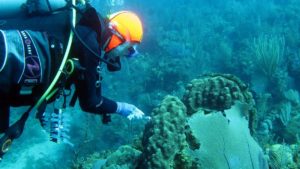
Laura Weber collects a syringe sample from seawater surrounding an Orbicella faveolata coral colony in Jardines de la Reina, Cuba. (Photo by Amy Apprill, Woods Hole Oceanographic Institution)
FALMOUTH – Researchers at the Woods Hole Oceanographic Institution have developed a new portable device called DISCO (DIver-operated Submersible Chemiluminescent sensOr) to take water samples even while submerged in order to help a study on the health of coral reefs.
The sensor specifically tests for a reactive type of oxygen, known as superoxide, which may play a vital role in the health of marine life.
The chemical is a byproduct of most organisms and is very unstable. Superoxide is a known catalyst in chemical reactions that can lead to cancer and other diseases as a result.
This is one of the reasons some diets stress antioxidant-rich foods like blueberries and nuts.
Generally, the chemical is considered to be toxic, according to WHOI marine chemist Colleen Hansel and coauthor for the study.
However superoxide can be beneficial to some biological processes such as an organism’s immune response.
How the chemical factors into the defenses of coral reefs is a primary question of this study.
Though superoxide is difficult to test as it dissolves quickly in water due to its unstable nature, the DISCO sensor will allow WHOI scientists to research the interactions superoxide has with the environment without having to return water samples to a lab.
The technology allows for tests to be performed right at the site of coral reefs.
The tests may help scientists understand how coral reefs fight off infection, which may be on the rise due to steadily warming waters.
























